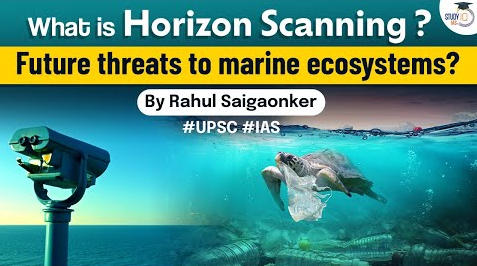Table of Contents

The News
About the paper
- A new study published in the journal Nature Ecology and Evolution has flagged emerging threats that could have a major impact on marine biodiversity over the next 5-10 years.
- The study also speaks about the negative impacts of green technology adoption that must not be ignored.
- A technique called ‘horizon scanning’ was used by a team of 30 multidisciplinary experts to arrive at their conclusions.
Horizon Scanning
- Horizon scanning is “a technique for detecting early signs of potentially important developments through a systematic examination of potential threats and opportunities, with emphasis on new technology and its effects on the issue at hand”.
- Horizon scanning is not simply about predicting the future, but it is focused on the early detection of weak signals as indicators of potential change.
The Current Study
- In this Horizon Scan, a team of 30 scientists, policymakers and practitioners with transdisciplinary expertise in marine and coastal systems was brought together to identify new issues that are likely to have a significant impact on the functioning and conservation of marine and coastal biodiversity over the next 5–10 years.
- The team finalized 15 issues from a list of 75 submitted by participants. These issues are grouped into three categories:
- Ecosystem impacts
- Resource exploitation
- New technologies
Have horizon scans been accurate?
- The horizon scan method was previously used to identify issues that are now known to have universal environmental impact.
- A horizon scan from 2009 gave an early warning about the danger that microplastics (tiny plastic debris smaller than 5 mm) pose to marine environments.
- Many countries including US & UK have banned cosmetics from containing microbeads.
Latest Burning Issues | Free PDF

























 WhatsApp
WhatsApp